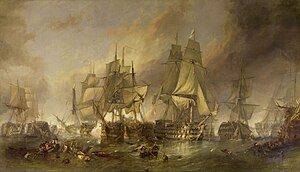| Trafalgar campaign | |||||||
|---|---|---|---|---|---|---|---|
| Part of the War of the Third Coalition | |||||||
Click image to load the battle. The Battle of Trafalgar, by Clarkson Frederick Stanfield | |||||||
| |||||||
| Belligerents | |||||||
|
|
| ||||||
| Commanders and leaders | |||||||
|
|
| ||||||
| Strength | |||||||
| 70 ships of the line[a] | 56 ships of the line[a] | ||||||
The Trafalgar campaign was a long and complicated series of fleet manoeuvres carried out by the combined French and Spanish fleets; and the opposing moves of the Royal Navy during much of 1805. These were the culmination of French plans to force a passage through the English Channel, and so achieve a successful invasion of the United Kingdom. The plans were extremely complicated and proved to be impractical. Much of the detail was due to the personal intervention of Napoleon, who as a soldier rather than a sailor failed to consider the effects of weather, difficulties in communication, and the Royal Navy. Despite limited successes in achieving some elements of the plan the French commanders were unable to follow the main objective through to execution. The campaign, which took place over thousands of miles of ocean, was marked by several naval engagements, most significantly at the Battle of Trafalgar on 21 October, where the combined fleet was decisively defeated, and from which the campaign takes its name. A final mopping up action at the Battle of Cape Ortegal on 4 November completed the destruction of the combined fleet, and secured the supremacy of the Royal Navy at sea.
